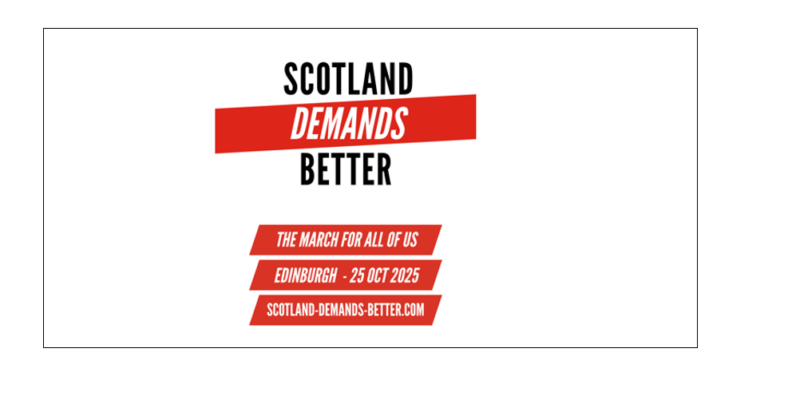
This month Voluntary Health Scotland signed up to the Scotland Demands Better campaign, led by the Poverty Alliance, a VHS member, and we invite our wider members to get involved too.
This campaign is calling for politicians to prioritise the changes needed to ensure that every household in Scotland can thrive and prosper. The demands include action for better jobs, better investment in essential services, and better social security all aimed at addressing the root causes of poverty and hardship in Scotland.
Peter Kelly, Chief Executive of the Poverty Alliance said:
“Change for the better happens when people stand together and demand it. Scotland desperately needs that change.
“People in the voluntary health sector know first-hand about the terrible impact that poverty and inequality have on people’s health, wellbeing and life expectancy. And they know it doesn’t have to be this way.
“We look forward to working with VHS and its members as they organise to join thousands of others on Saturday 25 October. Scotland Demands Better will be a landmark opportunity to unite and tell Scotland’s political leaders that we demand the fundamental changes and investment that will lead to a better future for all of us.”
VHS have chosen to support the campaign because living in poverty is proven to have a considerable negative impact on health and wellbeing. In Scotland, female life expectancy in the most deprived areas of Scotland was 10.5 years lower than in the least deprived areas in 2021-2023. Results are even more stark for men with a difference in life expectancy of 13.2 years.
Many of our members can help to shed a light on why the difference in life expectancy is so pronounced for people living in poverty. For example, a recent study funded by Chest Heart and Stroke Scotland found that stroke patients from deprived areas are less likely to receive guideline-recommended treatment after a stroke, increasing their risk of dying.
Similarly, Obesity Action Scotland have found that adults in the most deprived communities are twice as likely to have severe obesity than those in the least deprived communities. Affordable healthy food options are not always readily available, making it more difficult for those living in poverty to eat healthily. Obesity increases the risk of a range of potentially life-limiting conditions, including kidney disease, certain cancers, cardiovascular disease and Alzheimer’s disease.
Living with poverty also has a considerable impact on mental health and wellbeing. VHS member Samaritans Scotland published a report last year which found that those experiencing income inadequacy were more than three and a half times more likely to experience suicidal thoughts. In addition, those who received benefits were three times more likely to report having attempted suicide.
The impact of poverty becomes more acute when coupled with other social determinants of health. For example, Carers UK found in a 2023 survey that 27% of unpaid carers are struggling to make ends meet, 49% feel depressed, and 54% said that their physical health had suffered.
In addition, many ethnic minority communities – who are also more likely to live in deprived areas – report that they are more likely to be ignored, mistreated, or experience difficulties accessing health care due to language or cultural barriers. Vongayi Mufari, Advocacy and Community Engagement Manager at Amma Birth Companions, stated in this Health in Mind article that:
“I have lived experience of seeking asylum, and most people in the asylum system struggle with mental health issues due to traumatic experiences and struggling to integrate into their new communities due to culture and language differences. People seeking asylum aren’t allowed to work…which makes it difficult for people to afford travel to reach and build communities. Hence, they are lonely.”
Regarding our decision to support this campaign, VHS Chief Executive Tejesh Mistry said that:
“Poverty is clearly a determining factor for the cause health inequalities in Scotland. Our members are striving to address these barriers and to improve health for disadvantaged communities every day. The research and evidence across long term health conditions, mental health, ethnic minority communities, and vaccination uptake among other issues is clear to see.
“We must demand better, and I would ask all our members and wider partners to think seriously about supporting and promoting this campaign, to help people that are living in poverty and the organisations and individuals working tirelessly to support them.”
If you want to find out more about the Scotland Demands Better campaign, visit the campaign website.
